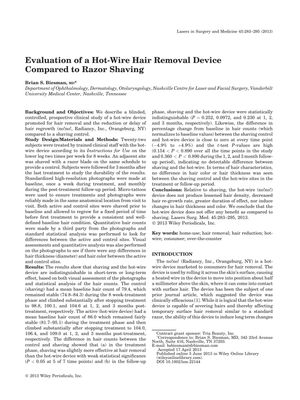TLDR The hot-wire hair removal device is no better than shaving.
A clinical study compared the effectiveness of a hot-wire hair removal device (no!no!) to traditional razor shaving on 22 subjects over an 8-week period, with a 3-month follow-up. Results showed no significant difference between the two methods in terms of hair density, regrowth rate, hair thickness, or color. Shaving was slightly more effective during the treatment phase, but both methods were statistically indistinguishable in the follow-up phase. The study concluded that the hot-wire device did not offer any benefits over shaving.
 134 citations
,
September 2008 in “Lasers in surgery and medicine”
134 citations
,
September 2008 in “Lasers in surgery and medicine” Low fluence photoepilation temporarily removes hair by targeting the hair follicle's pigmented area without severe damage.
 24 citations
,
March 2015 in “Dermatologic Surgery”
24 citations
,
March 2015 in “Dermatologic Surgery” Home-use cosmetic laser and light devices show modest results for hair removal and acne treatment, but more research is needed for confirmation.
1 citations
,
April 2009 in “한국생물공학회 학술대회” Onion extracts can promote hair growth, but quercetin is not responsible.

Human hair keratins can be turned into useful 3D biomedical scaffolds through a freeze-thaw process.
 10 citations
,
July 2011 in “Springer eBooks”
10 citations
,
July 2011 in “Springer eBooks” Carboxytherapy can improve skin conditions with few side effects, but results may vary and are not guaranteed.
 October 2020 in “Misr journal of agricultural engineering”
October 2020 in “Misr journal of agricultural engineering” Drying pomegranate peel is profitable and useful for various industries.





